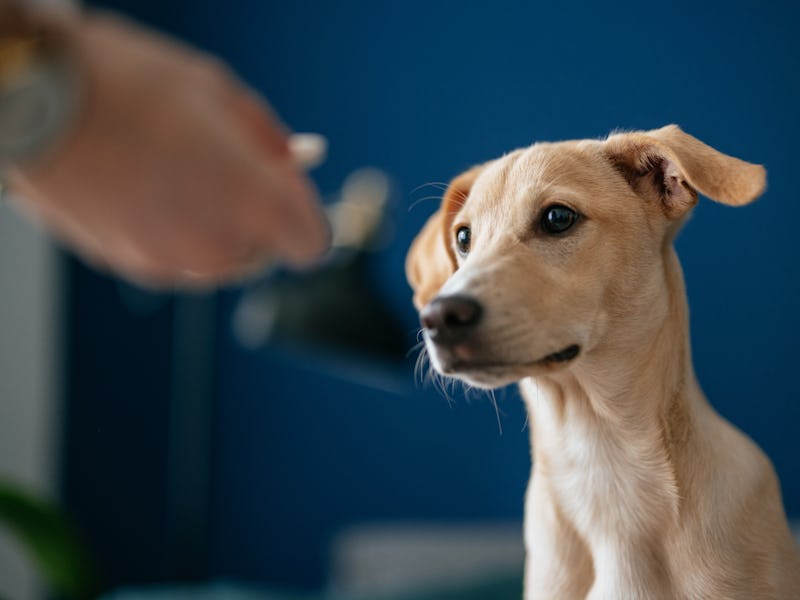Your Dog Might Be Carrying Antibiotic Resistant Strains of E. Coli, New Study Suggests
Antibiotic resistance is on the rise, even among our four-legged friends.

When the world’s first antibiotic, penicillin, was discovered in 1928 and years later used to treat bacterial infections, it changed the course of modern medicine. Fast forward to now and the fiendish microbes these drugs were designed to cull are pushing back, evolving mechanisms to sidestep even our most potent antibiotics. New research suggests a contributor to this rising antibiotic resistance may stem from our beloved furry friends.
In a study published Wednesday in the journal PLOS One, researchers in China examined bacterial strains of Escherichia coli collected from dog poop of animals with diarrhea. They found out of 135 strains isolated, over 87 percent were resistant to at least one commonly used antimicrobial agent, the highest resistance directed against ampicillin, a penicillin-type antibiotic. The study also found some multi-drug resistant E. coli harbor antibiotic resistance and virulence (or disease-causing) genes that are super common among tough, pathogenic bacteria.
These findings are part of an emerging trend — and growing public health concern worldwide — linking pets and other animals as potential reservoirs of antibiotic resistance, emphasizing the risk of transmission to humans and our need to be vigilant against it.
Not so commensal
In the new study, researchers led by Sichuan Agricultural University in China set out to better understand multi-drug resistant E. coli among pet dogs. Between August 2021 and June 2022, they swabbed fresh dog poop from animals with diarrhea who had not been on antibiotics (or hospitalized) at least the last three months prior.
From 185 fecal samples, the scientists isolated a total of 135 strains of E. coli and exposed the microbes to 16 different types of broad-spectrum antibiotics, drugs that can kill or inhibit a wide range of bacteria, versus narrow-spectrum antibiotics, which are more targeted. A little over 87 percent (or 118 out of 135) of these E. coli strains were resistant to one of these antibiotics, with almost 13 percent (or 17 out of 135) sensitive enough to be wiped out by all the antibiotics.
Over 76 percent of antibiotic resistance was against a class of beta-lactam antibiotics, which includes penicillin and ampicillin. This was followed by tetracyclines at 64 percent and sulfonamides (also known as sulfa drugs) at 59 percent.
The researchers also peered into the genomes of 74 multi-drug resistant E. coli strains. They found that these wily microbes carried a high diversity of genes associated with antibiotic resistance and virulence, particularly to antibiotics belonging to the beta-lactam, tetracycline, and the sulfonamide family. While E. coli itself is a commensal microbe — meaning that it frequently inhabits our intestinal tracts and rarely causes disease — the genetics of these multi-drug resistant strains marked them as belonging or at least related to extraintestinal pathogenic E. coli, which colonize the gut and can spread to other parts of the body to cause diseases like urinary tract infections.
These findings corroborate other studies uncovering similar findings of antibiotic-resistant E. coli in pets. One 2023 study published in the journal One Health found that feeding healthy dogs raw, likely contaminated meat resulted in antibiotic-resistant E. coli appearing in their poop, hinting again at the risk of companion animals inadvertently turning into potential reservoirs of disease.
The researchers of the new study caution, however, that their findings are limited geographically, as there may be other pathogenic E. coli or other microbes among companion animals that are important to look out for and monitor.
“Our findings have important implications for a preliminary understanding of the characteristics of [multi-drug resistant] E. coli from diarrheal dogs and evaluating the potential risk of resistance and virulence in canine E. coli,” the authors write in their paper. “Future investigations should include more samples and expand sampling areas.”
What causes antibiotic resistance?
The main cause of antibiotic resistance is, ironically, the antibiotics themselves. Through millennia of evolution, bacteria are excellent survivalists: When you take an antibiotic, most of the bacteria susceptible to the drug will die, but those that have special, resilient traits will survive and grow unhindered because the drug has taken out its competition.
While antibiotic resistance is a natural occurrence caused by genetic mutations passed down the family line (or even between microbes), excessive or inappropriate antibiotic use — like not finishing a course as prescribed or taking an antibiotic when you don’t need it — can accelerate the emergence and spread of such bacteria. It’s estimated that between 2000 and 2015, antibiotic use increased by 65 percent globally, particularly among low- and middle-income countries. In the US, more than 2.8 million antimicrobial-resistant infections happen annually, with more than 35,000 people dying as a result, according to a 2019 report from the Centers for Disease Control and Prevention.
An increasing number of antibiotic-resistant infections have also been reported in animals, also due to antibiotic overuse or taking them when not indicated. For example, cases of methicillin-resistant staphylococcus in animals (which causes staph infections) are on the rise worldwide. Studies have found that, because of their proximity, companion animals present a risk of infection, albeit low, especially to vulnerable populations like the young, elderly, and those with compromised immune systems. One 2023 study found of hospitalized individuals in Berlin, those who were pet owners shared genetically similar strains of multi-drug resistant bacteria with their dog or cat, hinting at the possibility of household microbial swapping.
While that might sound alarming, it’s important to remember not all microbial swapping with our pets is harmful. In fact, studies show your furry housemate can strengthen your own microbiome. For instance, engaging in more physical contact with a pet may protect against recurrent Clostridioides difficile (or C. difficile) infection among individuals who previously contracted the bacteria in a community setting. So pet your furry friends ad libitum, but please, also wash your hands after picking up their poop.